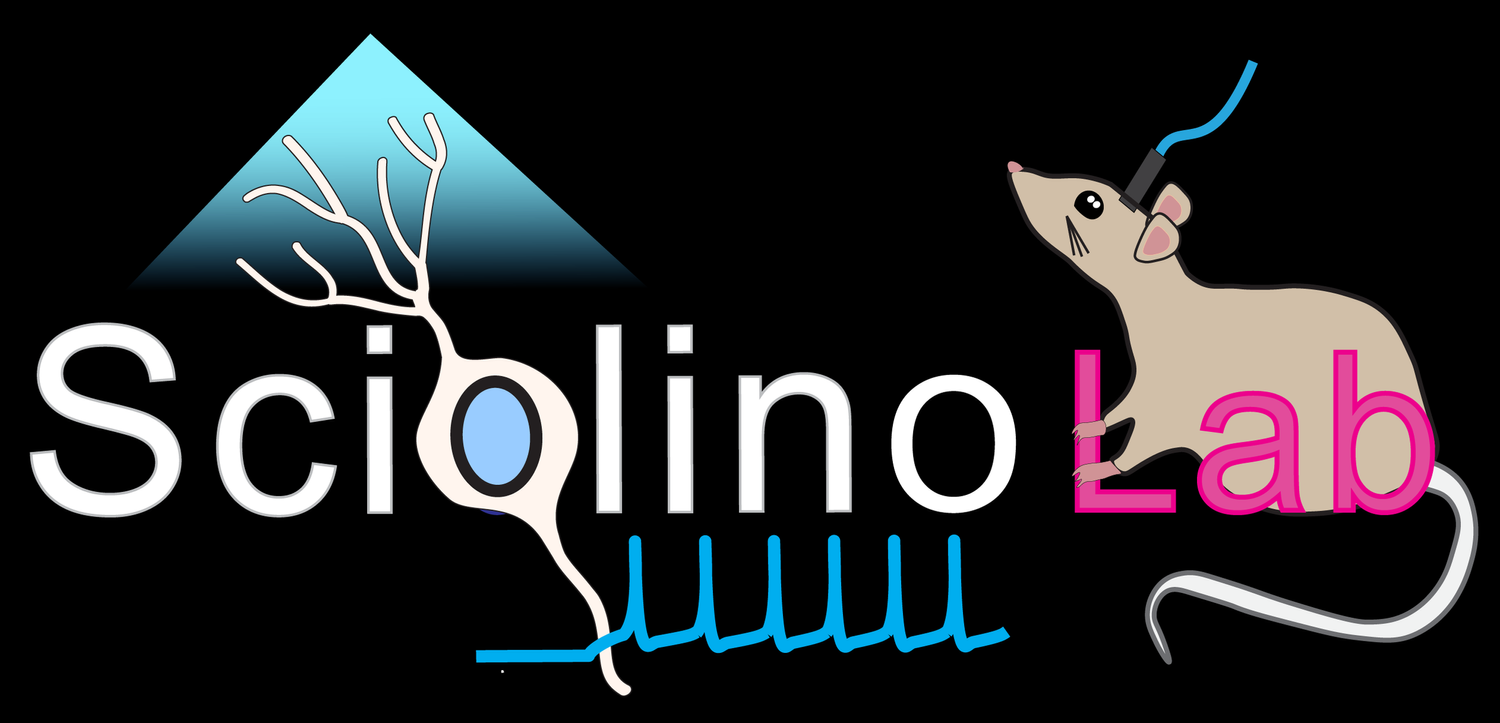
Natale Sciolino | CV
Education / Training
Biological Psychology, B.S.
SUNY Buffalo State
Completion Date: 05/2008
Neuroscience & Behavior, M.S.
University of Georgia
Completion Date: 05/2009
Neuroscience & Behavior, PhD
University of Georgia
Completion Date: 05/2014
NIH - National Institute of Environmental Health Science, Postdoc
Completion Date: 12/2020
Personal Statement
I am an Assistant Professor in the Department of Physiology & Neurobiology at the University of Connecticut. The focus of my research program is to define the connectivity and function of hindbrain norepinephrine (NE) circuits that regulate motivational processes related to feeding, reward, and emotion. We take a multidisciplinary approach to study the neurobiology of motivation using tools spanning genetic, molecular, cellular, & systems neuroscience. The goal of our research is to identify neural circuits that suppress feeding and promote goaldirected behavior, without negative side effects. While many studies have shown that locus coeruleusnorepinephrine (LC-NE) neurons promote defensive behaviors, much less is known about their contribution to appetitive and consummatory behaviors. Our research will 1) define the role of LC-NE neurons in feeding and reward 2) map their neural circuits, and 3) uncover their role in the biology and treatment of obesity, addiction, and anxiety. We use the latest advances in intersectional genetics, fiber photometry, opto-/chemogenetics, as well as cellular electrophysiology and behavioral and metabolic monitoring.
Position and Honors
Positions and Employment
2007-08 Research Assistant, Research Institute on Addictions, Buffalo NY
2008-14 Doctoral Student, University of Georgia, Athens GA
2014-2020 Postdoctoral Fellow, National Institutes of Health, National Institute of Environmental Health Sci.
2021- Assistant Professor, Physiology & Neurobiology, University of Connecticut, Storrs, CT
2021- Affiliated Faculty, UConn Institute of Systems Genomics, Storrs, CT
2021- Affiliated Faculty, Connecticut Institute for the Brain and Cognitive Sciences, Storrs, CT
Awards
2021-24 NIH R00 Pathway to Independence Award
2021 Guest Associate Editor, Frontiers in Neural Circuits, Deconstructing Neural Systems: From Molecular, Cellular and Circuit Properties to Behavioral Functions
2019-20 NIH K99 Pathway to Independence Award 2018 NIH Fellows Award for Research Excellence
2018 New Investigator Travel Award, Society for the Study of Ingestive Behavior
2018 Triangle Society for Neuroscience Best Poster Presentation Travel Award
2013-14 ARCS® Foundation Award for Significant Accomplishment in Biomedical Research
2014 Herbert Zimmer Scholar Award for Outstanding Research Accomplishments, Univ. of Georgia
2013-14 Dissertation Completion Award, University of Georgia
2013 Beverly Hirsch Frank Graduate Fellowship for Exceptional Women in Science, Univ. of Georgia
2012 Marine Biological Laboratory Travel Award, Neural Systems and Behavior Course
2011 NIH Award for the Lindau Meeting of Nobel Laureates
2009 NIDA Travel Award, College on the Problems of Drug Dependence Annual Meeting
2009 Chancellor Award, Highest Honor for Student Excellence by SUNY School System
2008 President’s Medal, Highest Honor for Excellence in Scholarship & Service, SUNY Buffalo State
2006-07 Ronald E. McNair Scholars Post-Baccalaureate Scholar
Invited talks
2021 Hot topics in Ingestive behavior, Society for the Study of Ingestive Behaviors, Virtual
2021 Kirby Neurobiology Center, Harvard Medical School/ Boston Children’s Hospital, Virtual
2020 Physiology & Neurobiology Department, University of Connecticut
2019 Catecholamines Gordon Research Conference and Seminar, Newry, ME
2019 Emerging technologies for gut-brain research, Duke Gastronauts Summit, Durham, NC
2016 NIEHS Science Days, Durham NC 2008 SUNY Buffalo State Commencement Address, Buffalo, NY
Professional Membership
2020- Catecholamine Society
2018- Obesity Society
2017- Society for the Study of Ingestive Behaviors (SSIB)
2014- Society for Neuroscience Triangle Chapter
2007- Society for Neuroscience (SfN)
Review Service
Nature Communications, Biological Psychiatry, Current Biology, Neuropharmacology, eLife, Swiss National Science Foundation
Departmental and University Service
Communications Committee, Beckman Mentor, MARC Scholar Selection Committee, IBACS Graduate Fellowship applications
Pubblications
Research Support
Ongoing Research Support
3/19/21 – 2/19/24
NIH R00 Pathway to Independence Award
“Defining norepinephrine locus coeruleus circuits in feeding”
National Institute of Diabetes and Digestive and Kidney Diseases (NIDDK)
Role: PI
R00DK119586-03
Completed Research Support
8/15/19 – 12/31/20
NIH K99 Pathway to Independence Award
“Defining norepinephrine locus coeruleus circuits in feeding”
National Institute of Diabetes and Digestive and Kidney Diseases (NIDDK)
Role: PI
K99DK11958-02
1/15/10 – 12/31/14
NIH Diversity Research Supplement
“Effects of voluntary exercise on reinstatement of cocaine seeking”
National Institute on Drug Abuse (NIDA)
Role: PhD Student
PI: David Weinshenker
DA027535
8/15/10 – 05/31/11
NIH Diversity Research Supplement
“An endocannabinoid mechanism for stress-induced analgesia”
National Institute on Drug Abuse (NIDA)
Role: Master’s Student
PI: Andrea Hohmann
DA021644
